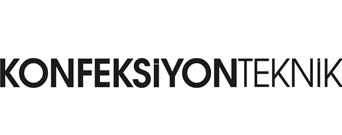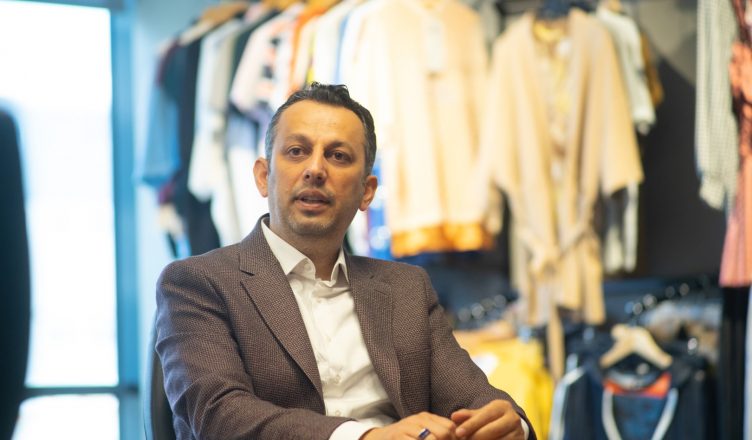Bordo Grubu Yönetim Kurulu Başkan Yardımcısı Fahri Şahin, “Tekstilde tüketici davranışları değişiyor. Yeni jenerasyonun talepleri farklılaşıyor. Tekstil sektöründe döngüsel ekonomi trendleri başkalaşıyor. Giyimde sürdürülebilirlik daha fazla önem kazanıyor. Türk tekstil sektörü için artık yeni şeyler söyleme vakti geldi.”
İş insanı Fahri Şahin, koronavirüs pandemisinin ardından hazır giyim ve tekstil sektöründeki yeni trendler hakkında açıklamalarda bulundu. Pandemi ile birlikte her sektörde olduğu gibi tekstilde de bir dönüşüm yaşandığına vurgu yapan Şahin, “Bu dönemde tekstil sektöründe en çok dijitalleşme konuşuldu ve konuşulmaya devam ediyor. Yapay zeka ve dijital dönüşüm eksenli tekstil uygulamaları rekabette kritik öneme sahip oldu. Dijital dönüşüme mesafeli olan tekstil işletmeleri rekabette geri kalmaya başladı,” dedi. “Salgının ardından tekstilde yeni bir düzen bizi bekliyor,” diyen Şahin, şöyle devam etti; “Endüstri 4.0’a uyumlu altyapısı olan, üretim süreçlerinde dijitalleşmeyi önemseyen, uzaktan çalışma iş modeline adapte olan ve tüm bu süreçleri verimli bir şekilde yöneten tekstil firmaları riskleri minimize ederek sektörde bir adım önde olacaktır.”
“PLM ÇÖZÜMLERİ PANDEMİDE DİJİTAL STRATEJİ SAĞLIYOR”
Tekstilde Yaşam Döngüsü Yönetimi (PLM) çözümünün yeni nesil bir uygulama olduğunu hatırlatan Fahri Şahin, “PLM çözümleri; moda, ayakkabı, spor giyim, lüks giyim ve ev tekstili gibi alanlarda faaliyet gösteren firmalara stratejik çözümler sunuyor. Operasyonel dijital dönüşüm hedeflerine daha kısa sürede ulaşmalarını sağlıyor. Yenilikçi bir işletme çözümü olan PLM ile firmalar tedarik zincirini daha verimli koordine edebiliyor. Pandemi gibi beklenmedik durumlara karşı da dijital bir strateji sunması açısından PLM, tekstil trendleri arasında önemli bir yer tutuyor,” dedi.
“SEKTÖRDE GÜNEŞ ENERJİSİ DAHA ETKİN KULLANILMALI”
Deneyimli tekstilci Fahri Şahin, yenilenebilir enerji kullanımının önemine de işaret etti. “Yenilenebilir enerji, doğa dostudur ve ekolojik bir sistemdir. Bunların arasında en önemlisi güneş enerjisi olarak karşımıza çıkıyor. Ekonomik hayatın lokomotiflerinden biri olan tekstil sektöründe çok fazla enerjiye ihtiyaç duyuluyor. Bu sebeple geleneksel enerji kaynakları yerine alternatif olarak yenilenebilir enerji kaynaklarına yönelmek zorundayız. Ülkemiz, yenilenebilir enerji kaynakları potansiyeli açısından zengin bir ülke. Tekstil sanayisinde üretim ve iklimlendirme aşamalarında yenilenebilir enerji kaynaklarının daha fazla kullanılması sağlanmalıdır. Böylece tekstilde ekonomi ve çevre açısından sürdürülebilir bir enerji stratejisi uygulayabiliriz.”
“GELENEKSEL TEDARİK ZİNCİRİ YÖNTEMLERİ YETERSİZ KALDI”
Fahri Şahin, pandemi sürecinde tedarik zincirlerindeki dijitalleşmeye de dikkat çekti. Beklenmeyen bu kriz ortamında geleneksel tedarik zinciri yönetimlerinin yetersiz kaldığını vurgulayan Şahin, “Tedarik zincirinde geleneksel yöntemler güncel iş süreçlerini karşılamakta yetersiz kaldı. Tekstil sektöründe de bunun olumsuz yansımaları oldu. Kısa ve orta vadede olağanüstü değişimlerden etkilenmeyen, sürdürülebilir, esnek ve dinamik tedarik zincirlerine daha fazla ihtiyaç olacak. Bu sebeple tekstil firmaları, operasyonlarında efektif tedarik zincirlerine yöneliyor. Konjonktürel durumların risklerini minimize eden tedarik zinciri yöntemleri sektörde daha fazla yer edinecektir. Firmalar, alternatif tedarik ve satış kanallarını belirlemeli; tedarik zincirlerinin alt fonksiyonlarını da yeni normal döneme göre uyarlamalıdır.”
“KIYAFETLERİN YÜZDE 90’I ATIK OLARAK İMHA EDİLİYOR”
Pandemi sürecinde tekstilde sürdürülebilir moda anlayışının daha fazla konuşulmaya başladığını ifade eden Şahin, “Sürdürülebilir moda, tekstil endüstrisine tam anlamıyla yerleşmiş durumda. Biz de Bordo Group olarak sürdürülebilir modaya büyük önem veriyoruz. Ürün bandımızda sürdürülebilir ve organik koton kumaşlar da var. Sürdürülebilir moda sadece üretimle ilgili bir süreç değil. Üretilen organik ürünler sezonu geçse bile tekrar kullanılabiliyor. Üretim süreçlerini yenilikçi, sürdürülebilir moda stratejisi ile organize eden tekstil işletmeleri, birçok bakımdan avantaj sağlayacaktır” diye konuştu. Fahri Şahin, bu konuda şu değerlendirmeyi yaptı; “Modada sürdürülebilir pazarlama ve satış stratejileri, yeni normalleşme döneminde tekstil sektörünün gündeminde. Tekstil endüstrisinin nasıl daha sürdürülebilir olabileceği konusundaki çeşitli dinamikler yer alıyor. Bir araştırmaya göre her yıl 50 tondan fazla kıyafet üretiliyor. Bunların yaklaşık yüzde 90’ı atık olarak imha ediliyor. Bu çok önemli bir rakam. Bunların geri kazandırılabildiğini düşündüğümüzde ekonomi ve çevre açısından ne kadar büyük kazanımlar elde edeceğimiz aşikâr. Organik koton ve dönüştürülebilir ürünlere yönelim var. Bu sebeple sürdürülebilir moda anlayışını sektördeki her aktörün ciddi olarak ele alması gerekiyor.”
“TEKSTİLDE YENİ ŞEYLER SÖYLEME VAKTİ GELDİ”
Yeni tekstil ekonomisinde dikkat çeken konuları da değerlendiren Şahin, şu ifadeleri kullandı; “Zararlı maddelerin salınımını azaltmak ya da durdurmak gerekiyor. Kıyafet tasarımlarında giyilme sayılarını artırmak için yüksek kaliteli kıyafetlere odaklanmak zorundayız. Tekstil ürünlerinde geri dönüşümde efektif bir süreç sağlamalıyız. Böylece her yıl milyarlarca dolarlık tasarruf sağlanabilir. Ayrıca, kaynakların etkin kullanımını sağlayarak, tekstilde yenilenebilir süreçlere odaklanmalıyız. Geri dönüştürülebilir tekstil ürünleri ile tekstil ekonomisinin hammadde girdilerine ihtiyacını azaltabiliriz.” Fahri Şahin, medikal tekstil ürünlerine pandemi ile birlikte büyük bir talep olduğunu da vurguladı. Medikal tekstil ihracatının kolaylaştırılması gerektiğini ifade ederek, sözlerini şöyle tamamladı; “Tekstilde tüketici davranışları değişiyor. Yeni jenerasyonun talepleri farklılaşıyor. Tekstil sektöründe döngüsel ekonomi trendleri başkalaşıyor. Giyimde sürdürülebilirlik daha fazla önem kazanıyor. Dünyada antibakteriyel ürünlere talepler artıyor. Çevreye duyarlı üretim süreçleri yadsınamaz bir hal alıyor. Tüm bunları üst üste koyduğumuzda Türk tekstil sektörü için artık yeni şeyler söyleme vaktinin geldiğini söyleyebiliriz.”
“It is time to say new things for the Turkish textile sector”
Bordo Group Vice Chairman Fahri Şahin explained that, “The consumer behaviours are changing in the textile sector. The demands of the new generation are different than the previous generations. The circular economy trends in the textile sector are metamorphosing. Sustainability in the clothing sector is becoming more important than ever. It is time to say new things for the Turkish textile sector.”
Businessperson Fahri Şahin made a statement about the new trends in the ready-made clothing and textile sector after coronavirus (Covid-19) pandemic. Şahin emphasised that the textile sector experienced a transformation like other sectors during the pandemic process and stated that, “In this period, digitalisation is the most popular topic in the textile sector and digitalisation continues to be the most popular topic. AI and digital transformation-based textile applications are critically important. The textile businesses that kept their distances with digital transformation begin to fall behind the competition.” He further stated that “A new order in textile is waiting for us after the pandemic” and added, “Textile firms that have infrastructure that matches Industry 4.0, those that care digitalisation in the production process, adapt to the remote-working business model and effectively manage these processes will minimise the risks and be one step ahead in the sector.”
“PLM solutions provide digital strategy in the pandemic”
Fahri Şahin reminded that Product Lifecycle Management (LM) solution in the textile sector is a new generation application and stated that, “PLM solutions are offered as strategic solutions to firms that are active in fashion, shoe, sportswear, luxury wear and home textile fields. These solutions enable the firms to achieve their operational digital transformation solutions in a shorter time. PLM which is an innovative business solution can coordinate the supply chain of these firms easier. PLM has an important position among textile trends as this solution offers a digital strategy in unexpected situations such as a pandemic.
“Solar energy must be used more effectively in ready-wear”
Experienced textile businessman Fahri Şahin remarked the importance of using renewable energy. He expressed using solar energy in ready-wear more effectively and continued, “Renewable energy is an environmentally-friendly and ecologic system. The most important resource among these is solar energy. The textile sector which is one of the locomotive sectors in economic life requires a high amount of energy. Therefore, we must be oriented towards the renewable energy resources as alternatives to traditional energy resources. Our country is rich in terms of renewable energy resources. We must make sure to use renewable energy resources more in production and climatization stages of the textile industry. Thus, we can follow a sustainable energy strategy in textile in terms of economy and environment.”
“Traditional supply chain methods fell short”
Fahri Şahin remarked the key role of digitalisation in the supply chain during the pandemic. Şahin emphasised that the traditional supply chain fell short in this unexpected crisis environment and expressed, “The traditional methods in the supply chain fell short for current business processes. This had negative reflections in the textile sector. We will need sustainable, flexible and dynamic supply chains that are not impacted from short- or medium-term extraordinary changes. Therefore, textile firms are directed to an effective supply chain in their operations. The supply chain management methods that minimise the risks under conjunctural circumstances will gain ground in the sector. The firms must determine alternative supply chain and sales channels and sub-branches of the supply chain must be adapted for the new normal.”
“90% of the clothes are destroyed as waste”
Şahin stated that sustainable fashion approach was mentioned more during the pandemic period and said, “Sustainable fashion is completely embedded in the textile industry. As Bordo Group, we greatly care for sustainable fashion. Our production line has sustainable and organic cotton textiles. Sustainable fashion is not only about the production process. We re-use the produced organic products when the season ends. Textile businesses that can organise their production processes with innovative, sustainable and fashion strategy will gain advantages in various ways.” Fahri Şahin assessed this topic as follows, “The sustainable marketing and sales techniques in the fashion are in the agenda of the textile sector during new normalisation period. There are various dynamics in how the textile industry can become more sustainable. According to studies, more than 50 tons of cloths are manufactured every year. Approximately 90% of these clothes are destroyed as waste. This is a huge number. When we think about re-using these clothes, it is clear that we will achieve greater gains for the economy and environment. Therefore, every actor in the fashion sector must seriously consider sustainable fashion approach.”
“It is time to say new things in the textile sector”
Şahin also talked about the popular topics in the new textile economy and said, “We need to decrease or prevent the harmful material emission. To increase the number cloth re-use in the clothing design, we need to focus on high-quality clothes. We need to provide an effective process for textile product recycling. This way, we can save billions of dollars every year. Additionally, we need to ensure effective resource use and focus on renewable processes in textile. We may decrease the raw material input need in the textile sector with recyclable textile products.” Fahri Şahin further emphasised that there is a high demand in the medical textile products during the pandemic. Şahin stated that medical textile export should be facilitated and concluded that, “The demands of the new generation are different than the previous generations. The circular economy trends in the textile sector are metamorphosing. Sustainability in the clothing sector is becoming more important than ever. The demand for anti-bacterial products around the world is increasing. The environmentally conscious production is becoming the undeniable truth. When we add these things up, we can say it is time to say new things about the Turkish textile sector.”
#bordogroup#fahrişahin#tedarikzinciri#PLMçözümleri#tüketicidavranışları#

